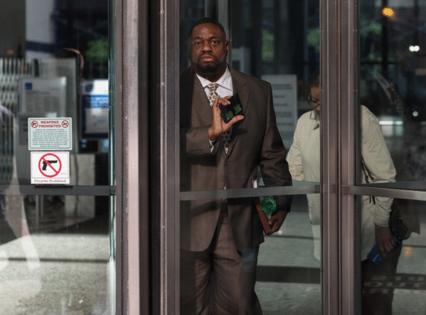Bribery vs. entrapment: Jury deliberating in trial of Illinois state Sen. Emil Jones III
Published in News & Features
CHICAGO — The jury in the federal bribery trial of state Sen. Emil Jones III has begun its deliberations, starting its discussions at about 2:30 p.m. Monday.
Before receiving the case, the jury was told Jones ignored “screaming red flags” in entertaining a red-light camera company executive’s ask for help with legislation in exchange for a promised $5,000 campaign contribution and a no-show job for his intern, federal prosecutors argued Monday.
In arguments that capped the nine-day trial, Assistant U.S. Attorney Tiffany Ardam asked jurors how Jones allegedly changed his views on red-light camera legislation over the course of the summer of 2019. Jones had been handling it for years by the time he met red-light camera executive Omar Maani, Ardam said.
How do we go from “I can’t give you that commitment” to “I got, you, I got you?” she said.
Ardam argued that it was the promised donation and a minimum-wage job for intern Chris Katz, negotiated over steak dinners and workshopped to avoid state reporting requirements, that made Jones pledge to “protect” Maani’s red-light camera company, SafeSpeed LLC, in the General Assembly and limit a proposed red-light camera study.
“Legislation and legislators should not be up for sale, for any price. That is a crime. ... That is why the defendant lied to the FBI when they came knocking at his door,” Ardam told the jury.
“The defendant knows this. He does not care,” she said.
Jones’ defense attorney Victor Henderson pitched the case to the jury as a David versus Goliath battle between the government and one man, arguing that federal investigators deployed Maani to try to entrap Jones into taking a bribe.
Jones, Henderson said, never took a bribe and instead steered Maani toward contributing food for a legitimate campaign event.
“He doesn’t go to Omar. They send Omar to him,” Henderson said of the FBI.
Henderson told the jury that Maani was a con man who secretly recorded people to get himself out of trouble with the feds. He questioned why Maani didn’t just give Jones an envelope of cash.
“If he’s dirty, why not just give him the money?” Henderson said.
Jones, a Chicago Democrat, is accused of soliciting $5,000 in campaign funding and a job for his former district office intern from Maani in exchange for Jones’ help with legislation in Springfield.
Jones, 46, whose father, Emil Jones Jr., led the state Senate for years before orchestrating to have his son replace him in 2009, is charged with bribery, use of an interstate facility to solicit bribery and lying to federal agents. The most serious charge carries up to 10 years in prison, while the others have a five-year maximum term.
According to the charges, Jones agreed to accept $5,000 in campaign funding from Maani in exchange for Jones agreeing not to push a bill calling for a statewide study of red-light cameras, which SafeSpeed considered potentially damaging to its bottom line.
Jones also offered to “protect” the company from his friend, then-state Rep. David McSweeney, who had filed bills of his own calling for an all-out ban of red-light cameras, according to prosecutors.
Jones is the first sitting member of the state General Assembly to face trial at the Dirksen U.S. Courthouse since then-state Rep. Derrick Smith was found guilty of bribery a decade ago. If convicted, Jones would be forced to resign under Illinois law and would almost certainly forfeit any future pension.
At the heart of the case are a series of undercover videos made by Maani as he sat down at steakhouses in Oak Brook and Chicago with Jones as well as then-state Sen. Martin Sandoval, the powerful and corrupt head of the Senate Transportation Committee who was taking cash payments from Maani in exchange for being SafeSpeed’s protector in the General Assembly.
Sandoval pleaded guilty to bribery charges and was cooperating with investigators when he died of COVID-19 complications in December 2020.
One video, from a meeting between Jones and Maani in July 2019 at Steak 48 on North Wabash Avenue, showed Jones digging into his favorite Wagyu filet as Maani brought up Jones’ upcoming fundraiser at Sox Park.
“How much money you want me to come up with?” Maani asked. “You tell me a number.”
Jones initially demurred, telling Maani no one had ever asked him that before. But Maani explained he was different, that he always wanted to meet expectations.
“You’re already meeting expectations, Omar,” Jones said, cutting into his steak while a hidden camera sat somewhere on the table across from him. “You’re a good guy. I like you all’s company a lot.”
Then Jones dropped the number: “If you can raise me five grand, that’d be good.”
“Done,” Maani replied quickly.
Jones testified in his own defense last week that he said Maani reminded him of a “used car salesman” and he was actually trying to blow him off. The internship request was nothing more than a routine job recommendation for a family friend and had no connection whatsoever to any red light camera legislation, Jones testified.
When the FBI knocked on his door on the morning of Sept. 24, 2019, the same day they raided Sandoval’s offices and several other locations, Jones said he chose to talk to the agents “because I knew I didn’t do nothing wrong and I had nothing to hide.”
_____
(Tribune reporter Ray Long contributed to this report.)
_____
©2025 Chicago Tribune. Visit at chicagotribune.com. Distributed by Tribune Content Agency, LLC.







Comments